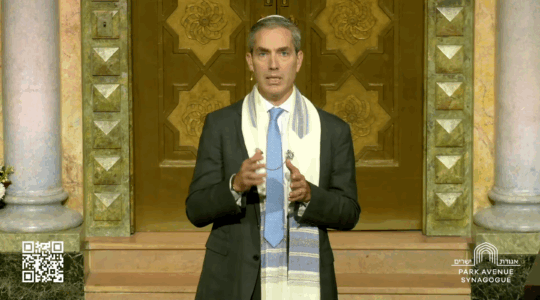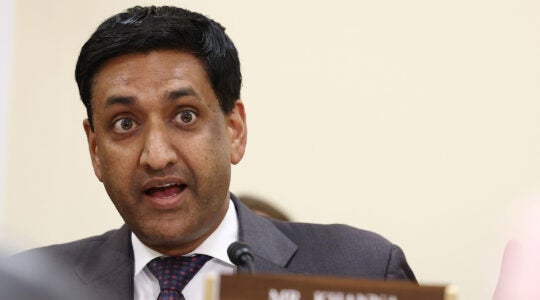WASHINGTON (JTA) — The official “readouts” describing conversations between world leaders are usually dry, information-deficient affairs, but the ones between President Joe Biden and Prime Minister Benjamin Netanyahu have been telling a story of diverging views on Israel’s war in Gaza.
Their most recent conversation, on Dec. 23, is an example: According to the Israeli readout, the Israeli leader “expressed his appreciation for the U.S. position at the U.N. Security Council,” referring to the Biden administration’s removal of calls for a ceasefire from a U.N. Security Council resolution. “The Prime Minister made it clear that Israel would continue the war until all of its goals have been achieved.”
The White House readout suggested why Netanyahu felt he had to make it “clear” that Israel would not stop until Hamas is crushed and the more than 100 remaining hostages abducted by the terror group on Oct. 7 are returned: Biden wants Netanyahu to change tactics.
“The leaders discussed Israel’s military campaign in Gaza to include its objectives and phasing,” Biden’s version said. “The President emphasized the critical need to protect the civilian population including those supporting the humanitarian aid operation, and the importance of allowing civilians to move safely away from areas of ongoing fighting.”
Biden, while maintaining his opposition to any ceasefire that leaves Hamas intact, has called Israel’s bombing in Gaza “indiscriminate.” His top officials, including Vice President Kamala Harris, Secretary of State Antony Blinken and Defense Secretary Lloyd Austin, have said that Israel risks losing support if it does not shift to more targeted warfare.
Both leaders are under pressure. Biden is facing Democrats on the left, and also surprisingly Republicans on his right, who want him to condition aid to Israel. Netanyahu’s popularity in Israel has plummeted and he needs his far-right flank to survive in office to avoid a crushing electoral defeat.
Here are some of the factors that could shape the Biden-Netanyahu relationship as we head into a new year.
That $14 billion
On Oct. 19, less than two weeks after Hamas terrorists massacred 1,200 people in Israel, abducted more than 240 and brutalized thousands more, Biden asked Congress for $14 billion in emergency assistance for Israel, along with $60 billion for Ukraine for its war against Russian invaders.
The aid for Israel seemed an easy ask then: Republicans have become the most reflexively pro-Israel party in Congress, and within three days of Biden making the request, more than half of the Democrats in the U.S. House of Representatives backed Biden’s Israel strategy, in a letter signed by all 24 Jewish House Democrats.
Marching into 2024, the funding has yet to happen and the responsibility lies, unusually, with Republicans, who lead the House.
The first obstacle was the removal of the Israel-friendly speaker, California’s Kevin McCarthy, leaving the House unable to function. He was replaced by Louisiana’s Mike Johnson. The House approved the Israel portion, but for the first time ever, the body conditioned aid to Israel — on cuts to the Internal Revenue Service. Far-right Republicans engineered McCarthy’s ouster for compromising with Biden on spending bills, and Johnson has no taste for playing nice with the president, even when Israel is involved.
Conditioning Israel aid on IRS cuts guaranteed that the bill was dead on arrival in the Senate, which is led by Democrats. There, Majority Leader Chuck Schumer, a Jewish New York Democrat, tried to craft a new assistance bill but was met with a new headwind. Republicans in the body are now using the filibuster to keep the bill from advancing unless it includes new protections on the Mexican border.
Sen. Bernie Sanders joined Republican senators in the Dec. 7 vote that blocked the assistance from advancing. The Jewish Vermont independent, an unofficial leader of U.S. progressives, wants Biden to condition aid to Israel on how it conducts the war.
Calls for a ceasefire
Sanders still stops short of calling for a permanent ceasefire, but a growing number of Democrats do — some 63 so far, including a number of the Jewish Democrats who back in October were backing Biden’s Israel policies.
The number of Palestinians killed since Israel launched its counterstrikes has topped 20,000, according to Palestinian sources, although Israel estimates that a third of these are combatants. Nonetheless, as casualties mount in the Gaza Strip, expect more pressure on Biden from the left.
The politics
Axios reported this week that Biden, in that Dec. 23 phone call, told Netanyahu that he expected him to show the same fortitude in resisting pressure from his right wing that Biden has shown in ignoring his left flank. Biden wants Israel to build up the Palestinian Authority after the war is over so it can replace Hamas; Netanyahu has said that is not an option.
One problem is the weakness of the Palestinian Authority, which has limited governance powers in the West Bank. Biden wants Netanyahu to resume transferring taxes to the Palestinian Authority, which Netanyahu resists as long as it continues to compensate the families of Palestinians who have attacked Israelis.
“This conversation is over,” Axios reported Biden as saying after he told Netanyahu that he needed to show the same level of leadership Biden is showing defending Israel.
Support for Biden’s Israel policy among Democrats has plummeted, and growing numbers of Arab-American and Muslim voters are saying they will stay away from the polls next November, when Biden is likely to once again face Donald Trump in a presidential election. That could cost Biden a key state, Michigan, where there is a substantial Arab-American population.
As Biden heads into the presidential election, the politics of the war are being seen in a phenomenon unimaginable a decade ago: Mainstream Democrats are running against the mainstream pro-Israel line. In California’s Senate race, Rep. Barbara Lee is seeking to set herself apart from the frontrunners, fellow Democratic representatives Adam Schiff and Katie Porter, by endorsing a ceasefire.
Minnesota Rep. Dean Phillips, a moderate Jewish Democrat running a longshot presidential primary campaign against Biden, also endorses a ceasefire. It’s one of the few policy differences distinguishing him from the incumbent.
JTA has documented Jewish history in real-time for over a century. Keep our journalism strong by joining us in supporting independent, award-winning reporting.






